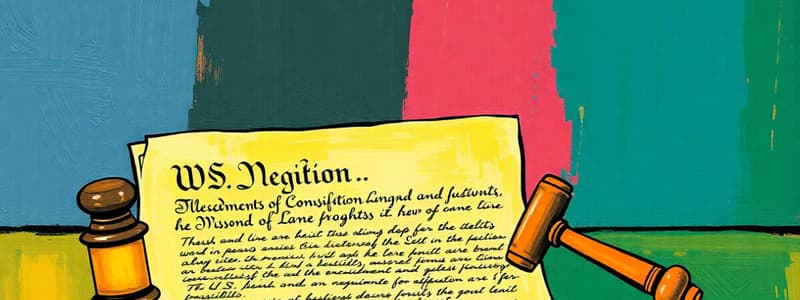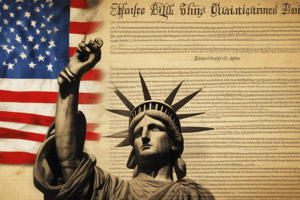Podcast
Questions and Answers
What happens if the President transmits a declaration of inability to discharge the powers of his office?
What happens if the President transmits a declaration of inability to discharge the powers of his office?
- Congress must immediately vote to confirm the Vice President as Acting President.
- The Vice President automatically assumes the presidency for a maximum of two years.
- The Speaker of the House becomes Acting President until a new election.
- The Vice President assumes the powers and duties as Acting President until further notice. (correct)
What is required for a Vice President nominated by the President to take office?
What is required for a Vice President nominated by the President to take office?
- A statewide referendum to approve the nomination.
- Simple confirmation by a majority vote of both Houses of Congress. (correct)
- Approval by a three-fourths majority of the Senate.
- An executive order from the Supreme Court.
If there is a disagreement over the President's ability to discharge his powers, what is Congress required to do?
If there is a disagreement over the President's ability to discharge his powers, what is Congress required to do?
- Wait for the President to return and provide additional clarification.
- Consult with the Supreme Court before taking any action.
- Hold a formal trial to decide the issue.
- Assemble within forty-eight hours to reach a decision. (correct)
Which amendment addresses the voting rights of citizens aged eighteen and older?
Which amendment addresses the voting rights of citizens aged eighteen and older?
What must occur for a law regarding Senators' and Representatives' compensation to take effect?
What must occur for a law regarding Senators' and Representatives' compensation to take effect?
What does the Eleventh Amendment specifically prohibit?
What does the Eleventh Amendment specifically prohibit?
In what year was the Twelfth Amendment ratified?
In what year was the Twelfth Amendment ratified?
What process is outlined for electors when voting for President and Vice-President according to the Twelfth Amendment?
What process is outlined for electors when voting for President and Vice-President according to the Twelfth Amendment?
What happens if no person receives a majority of votes for President according to the Twelfth Amendment?
What happens if no person receives a majority of votes for President according to the Twelfth Amendment?
Which section of the Constitution was modified by the Eleventh Amendment?
Which section of the Constitution was modified by the Eleventh Amendment?
What is required for the House of Representatives to choose a President when no majority occurs?
What is required for the House of Representatives to choose a President when no majority occurs?
Which statement about the role of the Vice-President in the Twelfth Amendment is true?
Which statement about the role of the Vice-President in the Twelfth Amendment is true?
What voting requirement leads to the House of Representatives choosing the President?
What voting requirement leads to the House of Representatives choosing the President?
What is required for a person to be elected Vice-President if no candidate has a majority of votes?
What is required for a person to be elected Vice-President if no candidate has a majority of votes?
Which amendment addresses the abolition of slavery and involuntary servitude?
Which amendment addresses the abolition of slavery and involuntary servitude?
What condition allows Congress to reduce the basis of representation in any State?
What condition allows Congress to reduce the basis of representation in any State?
What power does the 14th amendment grant Congress?
What power does the 14th amendment grant Congress?
What does Amendment XVI allow Congress to do without regard to apportionment?
What does Amendment XVI allow Congress to do without regard to apportionment?
Which group is prohibited from holding certain offices according to Section 3 of the 14th Amendment?
Which group is prohibited from holding certain offices according to Section 3 of the 14th Amendment?
What does Amendment XVII change about the Senate's composition?
What does Amendment XVII change about the Senate's composition?
In what year was Amendment XV ratified, securing voting rights irrespective of race?
In what year was Amendment XV ratified, securing voting rights irrespective of race?
Which amendment repealed Amendment XVIII that prohibited the manufacture of intoxicating liquors?
Which amendment repealed Amendment XVIII that prohibited the manufacture of intoxicating liquors?
What limitation does Section 2 of Amendment XIV impose on States regarding citizens?
What limitation does Section 2 of Amendment XIV impose on States regarding citizens?
What is the main purpose of Amendment XIX?
What is the main purpose of Amendment XIX?
Which of the following amendments allows for the appointment of electors from the District of Columbia?
Which of the following amendments allows for the appointment of electors from the District of Columbia?
Which Amendment repealed the Eighteenth Amendment related to prohibition?
Which Amendment repealed the Eighteenth Amendment related to prohibition?
What is the maximum number of terms a President can serve according to Amendment XXII?
What is the maximum number of terms a President can serve according to Amendment XXII?
What does Amendment XXIV state about voting rights?
What does Amendment XXIV state about voting rights?
What is the starting date for Congressional terms as established in Amendment XX?
What is the starting date for Congressional terms as established in Amendment XX?
What happens if the President elect dies before his term begins, according to Amendment XX?
What happens if the President elect dies before his term begins, according to Amendment XX?
Which Amendment grants Congress the power to enforce specific voting rights related to gender?
Which Amendment grants Congress the power to enforce specific voting rights related to gender?
Under what condition can Amendment XXI become inoperative?
Under what condition can Amendment XXI become inoperative?
What does Amendment XXV address regarding Presidential succession?
What does Amendment XXV address regarding Presidential succession?
Flashcards
Amendment XI
Amendment XI
Limits the ability of federal courts to hear lawsuits against states by citizens of other states or foreign citizens.
Amendment XII
Amendment XII
Established the process for electing the President and Vice-President.
Electoral College
Electoral College
A system for electing the President and Vice-President in the United States.
Presidential Election process
Presidential Election process
Signup and view all the flashcards
Majority of Electors
Majority of Electors
Signup and view all the flashcards
House of Representatives role in Presidential election
House of Representatives role in Presidential election
Signup and view all the flashcards
Vice President role in Presidential election
Vice President role in Presidential election
Signup and view all the flashcards
Article III, Section 2
Article III, Section 2
Signup and view all the flashcards
13th Amendment
13th Amendment
Signup and view all the flashcards
14th Amendment
14th Amendment
Signup and view all the flashcards
14th Amendment, Section 2
14th Amendment, Section 2
Signup and view all the flashcards
14th Amendment, Section 3
14th Amendment, Section 3
Signup and view all the flashcards
14th Amendment, Section 4
14th Amendment, Section 4
Signup and view all the flashcards
15th Amendment
15th Amendment
Signup and view all the flashcards
16th Amendment
16th Amendment
Signup and view all the flashcards
17th Amendment
17th Amendment
Signup and view all the flashcards
18th Amendment
18th Amendment
Signup and view all the flashcards
Presidential Succession
Presidential Succession
Signup and view all the flashcards
Vacancy in the Vice Presidency
Vacancy in the Vice Presidency
Signup and view all the flashcards
Acting President
Acting President
Signup and view all the flashcards
Presidential Inability Clause
Presidential Inability Clause
Signup and view all the flashcards
Voting Age Amendment (26th)
Voting Age Amendment (26th)
Signup and view all the flashcards
19th Amendment Focus
19th Amendment Focus
Signup and view all the flashcards
20th Amendment Focus
20th Amendment Focus
Signup and view all the flashcards
20th Amendment Presidential Succession
20th Amendment Presidential Succession
Signup and view all the flashcards
21st Amendment Focus
21st Amendment Focus
Signup and view all the flashcards
22nd Amendment Focus
22nd Amendment Focus
Signup and view all the flashcards
23rd Amendment Focus
23rd Amendment Focus
Signup and view all the flashcards
24th Amendment Focus
24th Amendment Focus
Signup and view all the flashcards
25th Amendment Focus
25th Amendment Focus
Signup and view all the flashcards
Amendment Ratification
Amendment Ratification
Signup and view all the flashcards
Concurrent Power
Concurrent Power
Signup and view all the flashcards
Study Notes
Amendments to the US Constitution
- Amendment XI (1795): Limits the jurisdiction of federal courts in lawsuits against states. Citizens of another state or foreign citizens can't sue a state in federal court.
Amendment XII (1804)
- Electoral College Reform: Specifies the process for electing the President and Vice President. Electors cast separate ballots for each office. The House of Representatives chooses the President if no candidate receives a majority of electoral votes. The Senate chooses the Vice President.
- Eligibility Clause: No person ineligible for President can be Vice President.
Amendment XIII (1865)
- Abolition of Slavery: Forbids slavery and involuntary servitude, except as punishment for crimes.
- Congressional Enforcement: Congress has the power to enact laws to enforce this amendment.
Amendment XIV (1868)
- Citizenship Rights: Defines citizenship for those born or naturalized in the U.S. States can't abridge citizens' privileges or immunities, deny life, liberty, or property without due process, or deny equal protection under the law.
- Apportionment of Representatives: Representatives are apportioned based on the total population, excluding untaxed Native Americans. States losing voting rights during rebellion have their representation reduced proportionally.
- Disqualification from Office: People who participated in rebellion or aided enemies can't hold federal or state office unless Congress removes the disability.
- Public Debt: The validity of the national debt is protected, including debts related to the Civil War. Debts incurred in aid of insurrection or claims for slave emancipation are illegal and void.
- Congressional Enforcement: Congress has the power to enforce this amendment.
Amendment XV (1870)
- Voting Rights (Race): Protects the right to vote regardless of race, color, or prior servitude status.
- Congressional Enforcement: Congress has the power to enforce this amendment.
Amendment XVI (1913)
- Income Tax: Gives Congress the power to tax income from any source without apportionment.
Amendment XVII (1913)
- Direct Election of Senators: Senators are elected by the people of each state, not by state legislatures. States determine qualifications for electors of the most numerous branch of the State legislature
Amendment XVIII (1919)
- Prohibition (repealed): Prohibited the manufacture, sale, or transportation of intoxicating liquors for beverage purposes. Concurrent power granted to Congress and states in enforcement
- Seven-year ratification deadline: This amendment is inoperative until ratified by state legislatures within 7 years
Amendment XIX (1920)
- Voting Rights (Gender): No denying or abridging the right to vote based on sex.
- Congressional Enforcement: Congress has the power to enforce this amendment.
Amendment XX (1933)
- Presidential and Congressional Terms: Changed the dates when presidential, vice presidential, senatorial and representational terms begin and end; providing for orderly transitions.
- Congressional Assembly: States the Congress assembly and when their sessions will start.
- Presidential Succession: Specifics succession of President if the President elect dies, fails to qualify, or is unable to serve.
- Time limit for ratification: This amendment is inoperative until ratified by three-fourths of several states in 7 Years
Amendment XXI (1933)
- Repeal of Prohibition: Repealed the 18th Amendment, ending prohibition.
- Congressional and States Enforcement: Addresses transportation and importation of alcohol in accordance with state laws.
Amendment XXII (1951)
- Presidential Term Limits: Limits the president to two terms in office.
Amendment XXIII (1961)
- Presidential Electors for the District of Columbia: Gave the District of Columbia electoral votes, proportionally the amount of senators and representatives a state would have.
Amendment XXIV (1964)
- Poll Taxes: Prohibits poll taxes in federal or state elections.
Amendment XXV (1967)
- Presidential Succession and Disability: Provides procedures for presidential succession in cases of removal, death, resignation, or disability.
Amendment XXVI (1971)
- Voting Age: Establishes 18 as the minimum voting age.
Amendment XXVII (1789/1992)
- Congressional Compensation: Prohibits laws changing congressional salaries from taking effect until after an election of Representatives.
Studying That Suits You
Use AI to generate personalized quizzes and flashcards to suit your learning preferences.




